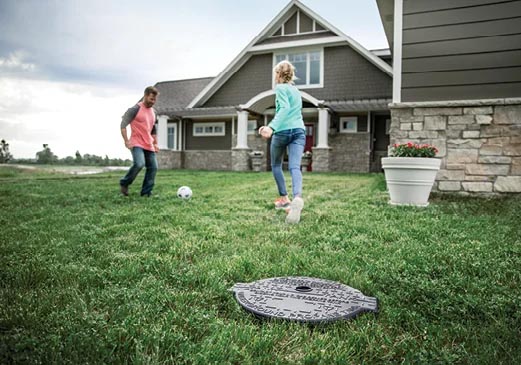Buying a House with a Propane Tank: A Homeowner's Guide
What you need to know about buying a home with a propane tank
Any way you slice it, moving can be stressful.
If you’re moving into a propane-powered home and that’s all new to you, you may have questions. Maybe you think propane is just a way to grill delicious food. While that is certainly true, propane is growing in popularity as the go-to option for fueling homes across the country.
For starters, fueling your home with propane has a few major benefits — it’s more affordable, more efficient, and it provides a more even, quality heat. Running your home off of propane puts money back in your pocket, it’s better for the environment, and it warms your home faster than an electrical system.
Fueling an entire home, or even just several appliances, with propane can help you save money on your monthly bills while reducing greenhouse gas emissions. Approximately 7.8 million households use propane for these benefits alone. Appliances like propane water heaters, gas dryers, propane ranges, and cooktops all offer versatility, cost-savings, and efficiency that can't be matched through other alternatives, including electricity.
If you’re new to the ins and outs of propane for homes, we’re in your corner and are here to help you with the transition. Let’s walk through some of the most commonly asked questions so you can have peace of mind.

Who owns the propane tank?
When purchasing a propane-equipped property, you’ll want to find out who owns the tank during the buying process. Keep in mind that there’s a good chance the tank is a rental.
The new homeowner would likely assume ownership of the tank if it belonged to the previous property owner. The new homeowner would assume ownership and responsibility for all ongoing tank maintenance. If the tank is a rental, you have the option to keep the tank and continue service with the existing provider or start over fresh with a new tank and new provider.
See how Ferrellgas can help you.
What is propane being used for?
Before signing the dotted line, you should find out which systems and appliances in the home run on propane. Propane can be used to fuel anything from heating systems to appliances like stovetops and washer/dryer units. Knowing the number of appliances powered by propane gives you the opportunity to calculate energy usage and costs.
What is the propane tank size?
Once you know what the propane tank is used for, knowing what size the tank is can help you determine when you might need a refill. Naturally, a larger tank allows you to go longer between refill appointments, but that doesn’t mean you should just go out and upgrade to the largest tank available. We suggest using our guide to propane tank sizing as a point of reference, or even calling your local Ferrellgas office to discuss which size tank is best for you.

Above ground or underground propane tank?
Deciding where to place your propane tank really comes down to one question: do you mind being able to see it in the yard? We say this because each option comes with its own set of pros and cons, neither of which makes one the obvious choice over the other. If you’re having trouble deciding, here’s a quick rundown of the pros and cons of above ground versus underground options:
The Benefits of an Above Ground Tank
The Pros of an Above Ground Tank
Ease of installation
Easy access for maintenance
Designed to withstand the elements
Cost-efficient installation
The Cons of an Above Ground Tank
Visible on the property
Requires a decent amount of yard space
The Benefits of an Underground Tank
The Pros of an Underground Tank
Saves space in the yard
Isn’t visible on the property
Provides additional protection from the elements
The Cons of an Underground Tank
Installation costs run higher
Routine maintenance takes a bit more effort
As a note, most underground tanks are sold new to our customers, meaning the customer owns the tank. Select Ferrellgas locations may allow you to lease an underground propane tank. Please speak with one of our Customer Service Professionals for more information.
What to do with the propane that’s left in the tank?
If you’re considering buying a home with leftover propane in the tank, there’s a good chance the current owner will want to sell what’s left in the tank to you. This process can get complicated and requires a written statement from the propane supplier stating the current market price and how much the propane should be sold for. After the sale, getting the tank topped off should be easy. You can request that we measure the amount of propane left in the tank during the transition of ownership.
Propane tank maintenance history
Asking for the maintenance history of a propane tank is an absolute must when touring a home. If you took over a well-kept propane tank, then continuing that trend will be a breeze. If the tank is above ground, you may find that all you need to do is give the tank a bit of a clean-up, such as removing rust or giving it a fresh paint job. However consistent the maintenance may have been, or how new the tank looks, we still suggest scheduling an appointment with a propane professional to have it inspected. You’ll want to be sure everything is in working order before you move in.
How to take care of your propane tank
Taking care of your propane tank is incredibly important. Just like your car, it’s critical to stay on top of maintenance and tune-ups.
If your tank is a bit older, removing some rust and giving it a fresh paint job should do the trick. To remove rust, use a wire brush and scrub the affected areas. Keep in mind, when you’re painting the tank, you must adhere to specific paint color guidelines and use a heat reflective color. A dark color absorbs heat and may expand the propane inside your tank, which could be a safety hazard. Lighter colors, such as silver, white, light grey, or the classic Ferrellgas baby blue color, are best.
Propane Tank Safety
Ferrellgas takes safety seriously. The safety of our customers and our employee-owners is our number one priority. That’s why we equip our customers with the information they need to safely use their propane tank. Simply download a copy of our Propane Safety Brochure or check out our list of propane safety tips so you’re prepared no matter what situation you encounter.
If you want to learn more about propane pricing in your area, or how Ferrellgas can help you with propane services during the transition of ownership, contact your local propane experts.
CATEGORIES
Archives
- Spring 2025
- Winter 2024
- Fall 2024
- Summer 2024
- Spring 2024
- Winter 2023
- Fall 2023
- Summer 2023
- Spring 2023
- Winter 2022
- Fall 2022
- Summer 2022
- Spring 2022
- Winter 2021
- Fall 2021
- Summer 2021
- Spring 2021
- Winter 2020
- Fall 2020
- Summer 2020
- Spring 2020
- Winter 2019
- Fall 2019
- Summer 2019
- Spring 2019
- Winter 2018
- Fall 2018
- Summer 2018
- Spring 2018
- Winter 2017
